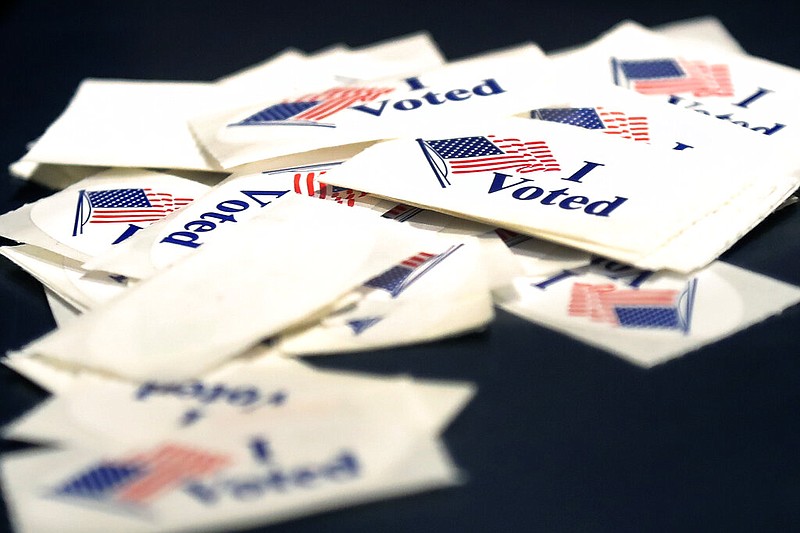The legal challenge to four new state voter laws saw its first day in court Tuesday, with the League of Women Voters and other plaintiffs claiming the laws deliberately make voting harder -- and sometimes impossible -- for voters that are poor, minorities or have certain health problems.
Supporters of the Republican-sponsored laws say they strengthen Arkansas' election integrity and bolster public confidence in the system.
The four laws at issue are Act 249, involving voter identification; Act 728, regulating campaigning around the polls; Act 736, affecting how ballots are validated; and Act 973, which sets deadlines for mail-in absentee ballots.
Five plaintiffs testified Tuesday before Pulaski County Circuit Judge Wendell Griffen that the laws create barriers to voting.
Act 736 was most discussed Tuesday. It standardizes the requirement that a voter's signature on an absentee ballot be verified by checking the person's voter registration application.
Health issues that affect the joints and fine motor skills, such as arthritis, osteoporosis and neuropathy, make it difficult for a person to grip a writing utensil, and this means the person's signature can change from day to day, let alone over several years, said plaintiffs Dortha Dunlap, Patsy Watkins and Nell Matthews Mock, all of whom are members of the League of Women Voters.
Dunlap, who is 86 and lives in Springdale, said she would feel "irate" if a discrepancy between two of her signatures resulted in her ballot being rejected.
"Voting is very important to me, and I feel strongly that everybody who is a citizen has a right to vote and should vote," she said. "I don't like for ballots to get thrown out for reasons that are minor technicalities and not any attempt to do an illegal action."
Dunlap said she has been registered to vote since 1956, and she often votes absentee because of her health problems. Attorneys showed her multiple signatures on absentee ballot applications, as well as her most recent voter registration form, which was from 2017.
If one signature was "looser" or "sloppier" than the other, she did not do this on purpose, she said.
Attorneys from the office of Attorney General Leslie Rutledge, said the law does not require signatures to be an exact match but instead says they should be similar. The plaintiffs agreed that similarity is not the same thing as matching.
Matthews Mock, a resident of Little Rock since 1992, said her osteoarthritis makes her dominant hand cramp. Like Dunlap, she verified that multiple ballot signatures were hers, and she said it would concern her if something that "varies quite a lot" was used to invalidate her vote.
She said she was also concerned about Act 728, which created a 100-foot exclusion zone around polling site entrances during voting, allowing entry only for "lawful purposes."
"That's kind of vague language, and who's going to decide whether I'm lawfully there or not?" Matthews Mock said.
Critics have drawn parallels between Act 728 and a Georgia law that specifically bans giving out food or drink to voters within 150 feet of a polling place, while supporters have said the law is intended to target loitering and would not prevent handing out refreshments to voters waiting in lines that sometimes last for hours.
In addition to concerns about her signature due to her arthritis, Watkins said she has a kidney condition that requires her to stay hydrated.
"When I vote early in person, which I try to do, I generally try to ... plan my time to go when I think there's not going to be a line," she said.
The line to vote early in the 2020 general election was longer than she anticipated, she said, and she would have accepted water from an election worker if it had been available.
Act 973 moved the mail-in ballot deadline forward from the Monday before an election day to the Friday before.
Fayetteville resident Jeff Rust, who regularly votes absentee, testified in a video deposition from December. He said he prefers to vote absentee because of his vision problems, tremors in his hands and anxiety in crowds.
"I can take my time and sit down with a ballot, and I don't have to hurry [or] stand in front of a screen," he said.
He and Bonnie Miller, president of the League of Women Voters in Arkansas, expressed concern about the changed deadline.
"There's the fear that they won't be able to mail in their ballot in time, and they also cannot then vote in person on Election Day," Miller said. "We have a lot of members who vote this way who are very concerned."
Act 249 eliminated an option for voters who can't immediately produce identification. Before, voters who couldn't provide IDs could instead give sworn statements to ensure their ballots were counted.
The trial continues today.
